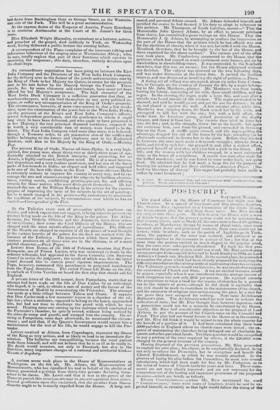At the Tuileries every sort of precaution which prudence can
dictate, and which experience can suggest, is being taken to prevent any attempt being made on the life of the King in the palace. The Aides- de-camp, the Orderly Officers, and the Adjutants, form three orders of surveillance ; then conic the Civil Officers of the House, who are charged with the most minute objects of surveillance. The Officers of the Hearth are charged to examine if all the pieces of wood brought to the various hearths of the palace for the tims are marked with the hammer of the Tuileries. The impression which these minute pre- cautions produces on all those who are in the chkeau, is of a most painful character.—Paris Paper.
Letters from Rome, of the 10th of February, mention that Peter Bonaparte, son of Prince Lucien, who was sentenced to death by the ordinary tribunals, had appealed to the Sacra Consulta (the Supreme Court) to revise the judgment ; the result of which was, that the latter Court decreed him to sixteen years' rigorous imprisonment. The Pope, however, commuted this punishment to perpetual banishment from the Papal dominions. The exiled Prince left Rome on the 8th, to embark at Civita Vecchia on board the first ship that should sail for England.
A private letter of the 10th instant, from Pampeluna, states that an attempt had been made on the life of Doll Carlos by an individual, who hoped, it is said, to obtain a sum of money and the favour of the
Government of Madrid by assassinating the Pretender. The attempt was made at a little village between Tolosa and Crate. It appears
that Don Carlos took a few moments' repose in a chamber of the vil- lage inn ; when a muleteer, supposed to belong to the house, approached him, but had not time to discharge the pistol with which he was armed. Hearing some one coming up the staircase which conducted to
the Pretender's chamber, he quietly retired, without being noticed by the aides-de-camp and guards, and escaped into the country. On ar-
riving at Pampeluna, some days afterwards, he mentioned the circum- stance ; and said that, if the Queen's Government would secure him a maintenance for the rest of his life, he would engage to kill the Pre- tender.
Letters received at Altona, from Copenhagen, represent the illness of the King as very serious, and as likely to lead to an immediate dis- solution. The bulletins are tranquillizing, because the royal patient reads them himself, and will not believe that he is so ill as he really is. His death would occasion, not only in Denmark, but also in the Dutehies, many important changes of a national and territorial kind.— Gazette d'Augsburg.


























 Previous page
Previous page